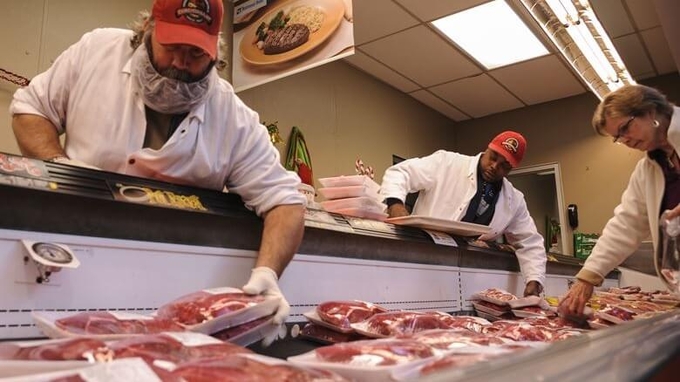May 20, 2025 | 21:00 GMT +7
May 20, 2025 | 21:00 GMT +7
Hotline: 0913.378.918
May 20, 2025 | 21:00 GMT +7
Hotline: 0913.378.918

Brazilian meat processing giant JBS supplies meat to companies all over the world. Photo: The Guardian.
Shares of JBS SA, the world’s biggest meat company, and other Brazilian beef producers slumped on the news that China is starting a probe into its imports of the meat, which have surged in recent years.
The Asian country, the world’s largest beef buyer, will decide if a surge in shipments from overseas has hurt the domestic industry, the Ministry of Commerce said Friday. The investigation, launched at the request of China’s domestic industry associations, is likely to end within eight months, but may be extended under special circumstances, according to a statement on the ministry’s website.
Any protectionist measures from China are likely to hurt major exporters, including Brazil, Argentina and Australia, as well as companies in the US.
Concerns over a potential drop for sales sent JBS and others tumbling. The top meat packer was among the worst performers in Brazil’s benchmark Ibovespa index on Friday, falling as much as 3.3%. Minerva SA dropped 3.1%, and Marfrig Global Foods SA lost as much as 7.8%.
China imports surged between 2019 and mid-2024, dealing a blow to the domestic industry, groups representing the animal husbandry sector from several top producing regions said in their petitions. China’s beef producers are struggling with huge losses after local prices plunged to multi-year year lows due to oversupply and sluggish consumption.
Brazil accounts for almost half of China’s total beef imports, and the Asian country holds similar significance for Brazil, typically purchasing nearly half the nation’s exports of the meat.
“It’s a nuisance, of course,” said Roberto Perosa, the president of the Brazilian Association of Beef Exporters. Still, he says Brazilian producers can be competitive even in a scenario of higher tariffs. The group also will also work to open new markets for Brazilian beef in hopes of diversifying exports in the long term. Ongoing efforts include negotiations with Japan, Vietnam, South Korea and Turkey, Perosa said.
Brazil’s Agriculture Ministry, Trade Ministry and Foreign Relations Ministry said in a joint statement that the country will seek to demonstrate that its beef exports don’t cause any kind of damage to the Chinese industry, and simply complement local production.
China’s move could also be a blow to North American companies.
US beef exports to China and Hong Kong climbed 16% in October to the largest in more than a year, according to the US Meat Export Federation. Still, overall exports to China in the January-to-October period are down 8%. The USMEF said it’s aware of the investigation and will be monitoring its progress.
In Argentina, the head of Argentine beef industry group Ciccra Miguel Schiariti said the nation is a much smaller exporter and therefore less likely to be targeted by any potential tariffs from China.
Still, Argentina’s government said it’s paying “maximum attention” to developments amid concern about the impact that any measures by China would have on Argentina beef exports there. China accounts for about two-thirds of Argentine beef exports.
Some earlier probes by China against other countries resulted in hefty taxes. It slapped anti-dumping duties in 2020 on Australian barley as diplomatic tensions escalated between the two trading partners.
Even though Brazil has embraced closer ties with Beijing, it has also pushed back against a perceived deluge of cheap exports from China.
Brazil imposed new tariffs on various products from China and other Asian nations in October, including a duty increase on fiber optics and cables, and iron and steel products.
Bloomberg

(VAN) In 2024, over 295 million people across 53 countries and territories faced acute hunger—an increase of almost 14 million people compared to 2023, while the number of people facing catastrophic levels of hunger reached a record high.

(VAN) World Environment Day 2025 (June 5) carries the theme 'Beat Plastic Pollution' continuing to emphasize the global urgency of addressing the plastic waste crisis.

(VAN) This was the assessment shared by experts at the workshop titled 'Assessing the Role and Potential of Low-Emission Rice Production Systems in Vietnam,' held on the morning of May 19.

(VAN) Cai Rong Port is the fisheries control center of Quang Ninh, helping to monitor fishing vessels, combat IUU fishing, and remove the EC's 'yellow card'.

(VAN) The German Agricultural Society (DLG) explores the possibility of establishing a mechanization service center in Vietnam’s Mekong Delta to support farmers in accessing and utilizing advanced machinery.

(VAN) On May 16, the Department of Water Resources Management, in collaboration with the Food and Agriculture Organization of the United Nations (FAO), held a signing ceremony for the GEF-8 project document.

(VAN) Food safety, mechanization, vocational training, and market opening are key areas of cooperation expected between the Vietnamese Government and the Federal Republic of Germany.